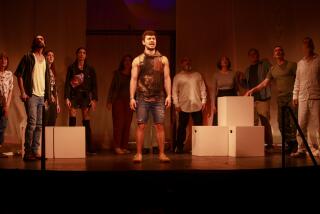‘Freedom of the City’
- Share via
In her review of Brian Friel’s powerful play, “The Freedom of the City,” directed by Fionnula Flanagan and currently running at Theatre West, Sylvie Drake strayed beyond her function as a drama critic and committed a few gaffes in the process (“Ambitious ‘City’ Tends to Stagger Under Burden of Its Own Weight,” Jan. 28).
She suggests that the core event that inspired Friel’s play, the Bloody Sunday massacre in Derry, “won’t necessarily stand out in the American consciousness,” a suggestion which she confirms by dating the event in 1970 rather than 1972.
Given the innocence of many Americans about history more ancient than the past decade, it causes only passing concern that Drake would be a couple of years off. Because of that very ignorance about history, however, it might have helped if she had informed readers that on Bloody Sunday British troops opened fire indiscriminately on unarmed men, women and children who had gathered for nonviolent, peaceful protest of the deprivation of civil and economic rights in the northern part of Ireland.
We find no reason to avoid contact with the tragic events of Bloody Sunday in Derry merely because Drake is, in her word, “inured” to violence and apparently callous about the painful situation that continues in Ireland to this day.
To the contrary, we urge your readers to see this production of “The Freedom of the City” and to let the medium of that particular story convey the universal message of the randomness of violence in our world, whether here in Los Angeles, or in the hills of Nicaragua and El Salvador, or the ghettos and townships of South Africa.
E. Mc GLYNN GAFFNEY JR.
ANNE O’HEALY
Los Angeles
More to Read
The biggest entertainment stories
Get our big stories about Hollywood, film, television, music, arts, culture and more right in your inbox as soon as they publish.
You may occasionally receive promotional content from the Los Angeles Times.










